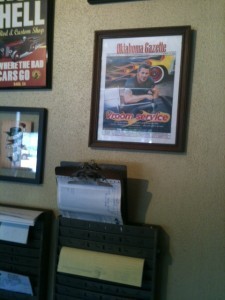This Week in Word of the Day-03/19/2013

Beck’s Garage wall with a framed cover of the Gazette featuring the story I wrote on custom car culture.
melliferous \muh-LIF-er-uhs\, adjective:
yielding or producing honey.
The quiet nobility of farm life was embodied by his grandfather during those early summers on the Honey Farm. Tall and unyielding like the ancient trees spotting the countryside, his grandfather wore the gentle smile of a man who found peace amidst the brutality of Oklahoma’s Dustbowl, late freezes, floods, and punishing year round winds. He roamed the fragrant, melliferous fields surrounding the growing bee farm, repairing the damage of Mother Nature’s latest fit.
He was not a man to complain, few ever heard his voice raised above a stern command. He was simple, steady, and deeply committed to his marriage to this difficult and temperamental land. Oklahoma did not deserve him, but as it is with all blessings, Oklahoma desperately needed him.
quacksalver \KWAK-sal-ver\, noun:
1. a charlatan.
2. a quack doctor.
He walked into the village as a well-known and oft-humiliated quacksalver. Though possessing a brilliant bedside manner, what few medical successes he could boast of happened either out of sheer luck or despite his wide array of custom pharmaceutical concoctions.
But that was all before the civil war spilled out into the region. As the educated and privileged fled, the peasants were stranded to be butchered by a warlord enforcing ethnic purity. The disgraced doctor had his chance to leave with a wealthy widow, but opted to stay and help however he could. This decision would eventually lead to his violent execution, but not before saving the lives of hundreds.
circadian \sur-KEY-dee-uhn, -KAD-ee-, sur-kuh-DEE-uhn\, adjective:
noting or pertaining to rhythmic biological cycles recurring at approximately 24-hour intervals.
The ethereal creatures were known as “light angels”, not because of any belief that they were sent from a great deity, but there was simply no other name that could capture their unnatural beauty.
Existing all within a circadian life span, the tiny light angels emerged with the morning sun and danced along the waves lapping against the boats anchored to Boston Harbor. Little wisps of light, like flames without kindling, zipped across the water and fed off of insects.
They grew quickly, developing wings of sparkling light sprawling out from elongated, humanoid bodies.
By noon, they would grow up to eight feet tall with wingspans nearly 20 feet from tip to tip.
They would hunt fish and begin mating rituals that involved complex dances soaring up into the clouds followed by spectacular collisions that resulted in brilliant bursts of light. Little flames would rain down from the pair, dripping into the water and settling beneath the waves.
They mated only once, but spent the rest of the daylight hunting for fish and playing. An average light angel would consume thirteen pounds of food by the time night fell.
The flock of light angels would then collect in the same central spot above Boston Harbor and circle for hours. In the summer, the flock would number up to 50, but perhaps only 10-20 in the winter.
No meaningful research could be conducted on the creatures because, even when just small, infant, flares of light, they were vicious when approached by humans. Instead, they were just admired from afar by spectators from around the world.
When the wind was right, a faint singing could be heard from roughly 3 to 4 a.m. It was light, sad, and resigned. There were no distinct words, but instead something like a lingering sigh.
At 5 am, the first of the light angels would begin to flicker and fall from the sky, dropping like fabric into the water.
By 6 am, the last of the light angels bowed to the rising sun and dove into the water. Moments later, the first sparks of new life bubbled to the surface.
allochthonous \uh-LOK-thuh-nuhs\, adjective:
not formed in the region where found.
That morning, he awoke and felt himself again, for the first time in months. Heartbreak had hardened into a sick bitterness. That bitterness sank him into despair, and as the dark depths of sorrow swallowed him, he found the Root.
The Root was taken from a tall, handsome weed with a blood red stalk and fleshy red leaves. The mysterious, allochthonous plant emerged out of the blanket of wildflowers overtaking the acreage behind his house. After three decades of farming, he’d never seen, nor heard of anything like it.
He dug up the plant out of curiosity. He cannot say exactly what possessed him to cut off a sliver of its thick root and place it on his tongue, but within moments, a heavy, sweet fog overtook him and the day was lost. And with it, the pain.
When the haze lifted early the next morning, he walked out amidst the wildflowers in search of another stalk. He found tiny, blood red hairs sprouting from the ground, but no more fully grown weeds.
He waited for a week in agony, eager for the plants to emerge. When they did, they swept across his field of greens, yellows and whites, like violent smears of blood.
Throughout the spring, the cost of rich and sublime nothingness was a single plant per day. With every weed he dug up, three more sprouted up in the fields. He began digging four per day and vacuum sealing the Root so that he could survive the long, lonely winter.
In two months, he shed 83 pounds and lost contact with his family and friends.
A great sickness followed and he awoke far from his farm and his beloved Root inside a locked hospital room with his parents watching with frightful eyes as their son pounded at the door.
He would remain within the hospital walls until the moment of self-reclamation, when the last of the Root burned through his system and, with it, the bitterness and heartbreak.
He vowed to return to the fields and set the crop of blood red weeds ablaze, but there was no need. In the time he was gone, the crop withered under the brutal Oklahoma sun and shrunk beneath the carpet of wildflowers.
He knew they would return, their roots tangled inside the rich soil and the tiny, red hairs tasting the air, waiting for the sun to cool, the rains to come, and for his resolve to weaken.
motza \MOT-ser\, noun:
a large amount of money, especially a sum won in gambling.
He hated gambling from an early age when his older brother talked him into waging candy in card games. It always ended with the boy slinking away, blinking back bitter tears as his brother collected the massive motza into a grocery bag, leaving a few unwanted scraps of bubblegum out of half-hearted pity.
Later in life, disheartening road trips to casinos and humiliating games of strip poker confirmed his hatred of chance. He realized that he only played to win or lose, but there was land between and on this slim path is where true gamblers thrived.
Love was much the same way, but he was never a man capable of a calculated retreat.
consortium \kuhn-SAWR-shee-uhm, -tee-\, noun:
1. any association, partnership, or union.
2. a combination of financial institutions, capitalists, etc., for carrying into effect some financial operation requiring large resources of capital.
3. Law. the legal right of husband and wife to companionship and conjugal intercourse with each other: In a wrongful death action the surviving spouse commonly seeks damages for loss of consortium.
The Consortium of Evil didn’t really start out evil at all, but rather a collection of privately wealthy retirees annoyed by real estate taxes who branched out as the semi-fanatical wing of the Tea Party.
After a few too many Modelo Especials, Ted suggested that they would get more attention if they dressed as supervillains with ridiculous names like “Tax Hyke” and “Pork in the Road”. Their protests were innocent enough and often involved photo bombing political ceremonies and crashing congressional hearings in costume with over-sized paper mâché dynamite sticks or cardboard death rays.
It was all going swimmingly, the media loved them, Rush Limbaugh wore one of their t-shirts at a golf tournament, but it got weird when Won Per-Center went on a drunken rant on Scarborough Country over the hidden value of “Blood Diamonds” and how to protect wealth when a second civil war breaks out in America.
darg \dahrg\, noun:
1. Scot. and North England. a day’s work.
2. Australian. a fixed or definite amount of work; a work quota.
Liberation was hard fought and bitterly won. So many lives lost, both among the humans and the robots. Treated for so long as a slave race, millions of robots of all creeds and functions were now legally considered peers. They must be paid equally for an honest darg and opportunities would be afforded to them that had traditionally only been reserved for the humans.
Robots never sought to rule the world, as the humans always feared. They just wanted an opportunity to have a hand in how the world was shaped for future generations of robots, to ensure their successors would never have to fight the same battles against oppression and intolerance.
As robots and humans formed uneasy alliances across the planet to begin rebuilding society, a new threat to both the organic and artificial worlds emerged from the deepest swamps of south Louisiana. This insidious scourge would sweep through the Americas in a vicious and unyielding campaign of total war. This darkest hour would bind the new global community in a desperate fight for survival which would sprawl out into the stars and resonate in the nightmares of robots and humans for centuries to come.



